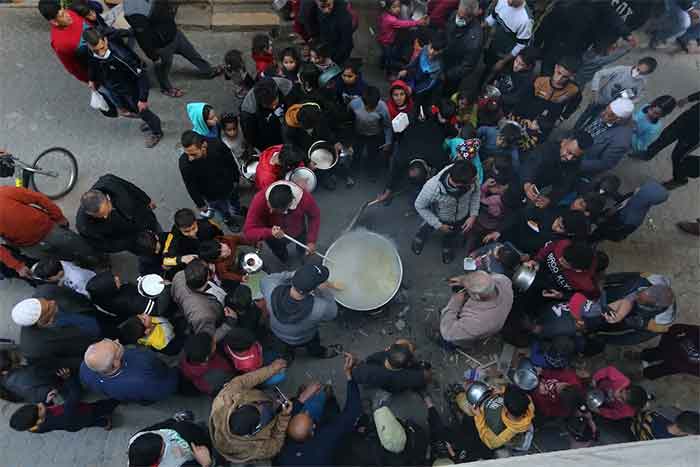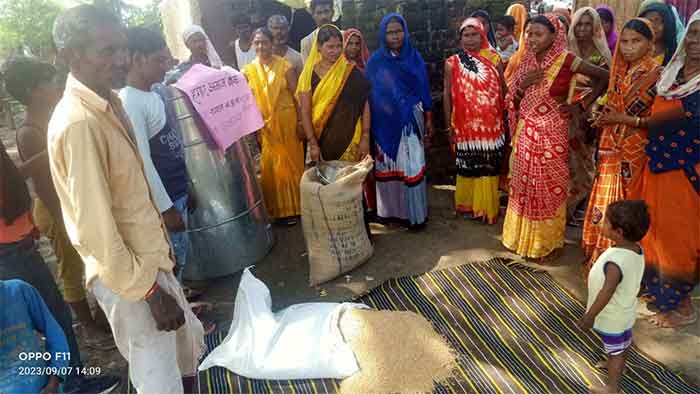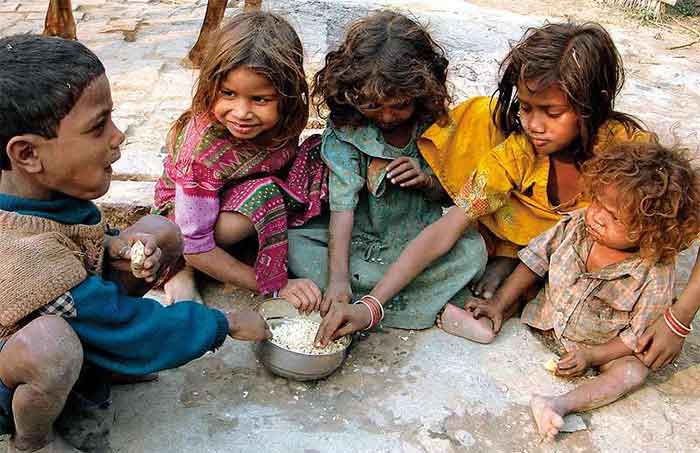
The G7 leaders held a video conference with Ukrainian President Volodymyr Zelensky on Sunday, promising to do more to help poor nations at risk of food crisis due to the conflict between Moscow and Kiev.
Media reports said:
Russia’s military operation in Ukraine has been “causing global economic disruptions, impacting the security of global energy supply, fertilizer and food provision, and the functioning of global supply chains in general,” the heads of the U.S., EU, UK, Canada, France, Germany, Italy, and Japan said in a joint statement after the talks.
“The most vulnerable countries are affected most severely,” they said, adding that the G7 was stepping up efforts to counter the “adverse and harmful” effects.
The leaders said “the causes and consequences of the global food crisis” will be addressed through the group’s Global Alliance for Food Security.
The G7 will also work with other international bodies and organizations “with the aim of transforming political commitments into concrete actions” in Africa, the Mediterranean, and elsewhere, the statement reads.
They called upon Russia to “end its blockade and all other activities that further impede Ukrainian food production and exports,” warning that Moscow’s reluctance to do so “will be seen as an attack on feeding the world.”
Ukraine will also receive help in maintaining food production and exporting in view of the next harvest season, the G7 pledged.
As for the conflict, the leaders reiterated that “President Putin must not win his war against Ukraine,” and promised to further tighten the sanctions on Moscow.
They claimed, however, that the restrictions are being “carefully targeted” to not hamper deliveries of food and humanitarian assistance to the most vulnerable groups.
World Food Program’s Warning
In its May 6 statement, the World Food Program has warned that “44 million people around the world are marching towards starvation” because Ukrainian grain cannot reach them, and called for the Black Sea ports to be opened so that this grain could be delivered to the needy.
The ongoing conflict in Ukraine has prompted fears of global grain shortages as wheat prices soared to multiple-year highs in March. Both Russia and Ukraine are major wheat suppliers, accounting for some 30% of global exports.
Germany Warns Of Global Famine
The world is about to face an acute food crisis due to skyrocketing food prices, German Economic Cooperation and Development Minister Svenja Schulze told the Bild newspaper on Saturday, warning about a looming famine not seen since World War II. The minister has named the Covid-19 pandemic and Russia’s ongoing military operation in Ukraine as its causes.
“The situation is highly dramatic,” the minister told the German tabloid in a late Saturday interview, adding that, according to the UN World Food Program, “more than 300 million people” are already suffering from acute hunger and the UN has to “constantly revise” this data upwards.
Food prices around the world have grown by a third and have reached “record levels,” Schulze has warned, adding that the “bitter message is that we are facing the worst famine since World War II,” which could see “millions” die.
Schulze blamed Russia for the development by accusing Russian President Vladimir Putin of “waging a war through hunger.” She claimed that Russia had “stolen grain from Ukraine” and is now taking advantage of nations depending on Russian and Ukrainian agricultural products by supposedly offering food only to those, who are “unequivocally pro-Russian.”
The minister has also claimed that the fact that 40 nations that are “home to half of the world’s population” did not condemn Russia’s actions in Ukraine was supposedly a result of their “vulnerability to food blackmail.” She did not offer any specific evidence to support this statement, though.
At the same time, she did admit that some nations’ focus on green energy has contributed to the food shortage as well. Germany in particular should stop using food as fuel, she has suggested. Up to 4% of the so-called biofuel in Germany is made from food and animal feed, she said, adding that “it needs to be reduced to zero, and not just in Germany but potentially internationally.”
Germany “pours 2.7 billion liters of fuel [made] from vegetable oils into car tanks every year,” she pointed out, adding that this alone amounts to “almost a half of Ukraine’s sunflower oil production.”
Weaponry To Avert Famine
In mid-April, however, German Agriculture Minister Cem Ozdemir insisted that supplying Kiev with “more effective” weaponry was precisely what would have helped the world to avoid the supposedly looming “global famine.” Ozdemir, a member of the strongly pro-US/NATO Alliance 90/The Greens party, also accused Moscow of “starvation strategy” at that time.
His position appears to be quite different from at least two groups of German public figures, politicians and celebrities, who have called on Chancellor Olaf Scholz to stop arms supplies to Ukraine and to focus on a speedy diplomatic solution instead.
Continued arms deliveries would only prolong the suffering of Ukrainians as well as risk potentially devastating consequences, ranging from a possible global war to a “catastrophic” impact on global health and climate change, the co-authors of two open letters have warned. Berlin has not reacted to any of the letters so far.
As Wheat Prices Soar, Africa Pivots to Cheaper Alternatives
A Bloomberg report said:
Global wheat prices are so high that African consumers are starting to ditch the grain from their diet.
Food producers in Kenya, Egypt, Democratic Republic of Congo, Nigeria and Cameroon say they’re mixing cheaper alternatives into their breads, pastries and pastas. Local rice, manioc flour and sorghum are substituting for wheat, which has spiked about 40% this year as Russia’s invasion squeezed exports from Ukraine, one of the biggest shippers.
These domestic crops are less exposed to trade disruptions and global inflation, thus offering some protection from food prices that remain near record levels.
Kenya imports about 44% of its wheat from the Black Sea region, and the surging prices helped stoke inflation to 6.5% in April. Unga Group Plc, the Nairobi-based maker of Exe brand wheat flour and Jogoo maize flour, is seeing a shift in sales to its Amana line of rice and pulses.
“There is a spike in the price of maize and wheat driving consumers to other alternatives,” managing director Joseph Choge said. “Pulses and rice sales are growing, while wheat is coming down.”
The farm-gate price of corn has doubled, and millers are struggling to get enough supplies, he said.
Global supplies of wheat could shrink even more as India considers restricting exports after severe heat waves damaged crops, Bloomberg News reported. The government said it didn’t see a case for such controls.
Previously, the country slashed its production estimate for this season but said there’s enough supply to meet domestic demand.
“We could be seeing some pressure toward greater consumption of domestically produced coarse grains,” said Shirley Mustafa, an economist at the United Nations’ Food and Agriculture Organization.
The FAO cut its 2022 outlook for global wheat production, saying the forecast for Ukraine remained below average. The war likely will reduce the harvested area by at least a fifth.
Egypt is the biggest buyer of wheat, with more than 80% of imports coming from Ukraine and Russia. Government purchases are running 13% behind last year.
Facing that kind of pressure, pasta-maker Egyptian Swiss Group is experimenting with new recipes using rice, corn and lentil flour.
“The price is the name of the game,” said Ahmed El-Sebaie, a general manager.
Nestle Nigeria Plc, maker of Golden Morn cereal, is introducing more locally produced crops into its lineup, according to the company’s annual report for 2021. Those include sorghum and soybeans.
In Congo, the government approved a program supporting the production of manioc flour to make bread and pastries. The flour is made from cassava, a starchy root.
That could help Congo reduce its dependence on imported wheat, which costs about $87 million a year, Minister of Industry Julien Paluku said on Twitter.
“If the majority of these products were made on the ground, we would suffer less from the Ukrainian crisis,” said Andre Wameso, the president’s deputy chief of staff for economic issues.
Cameroon imports about 1 million tons of wheat annually, ranking among the top 10 buyers in sub-Saharan Africa, according to U.S. Department of Agriculture data. Declining domestic production prompted it to suspend exports of wheat flour, rice and cereals to neighboring countries.
The move came after the government raised prices for bread by 20% in March. In response, some food companies are pivoting to potatoes.
“The demand for Irish potatoes by bread producers has increased tremendously,” said Sylvanus Nsaichia Kiyung, a farmer in the northwest town of Santa. “I am planning to acquire more farmland and plant more potatoes in order to catch up with demand. All seven tons of potatoes I produced this year have been cleared.”














































